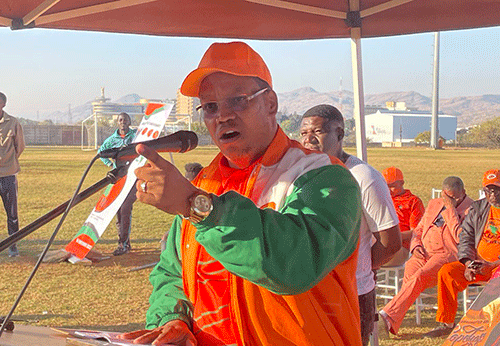Lahja Nashuuta
Landless People’s Movement leader Bernadus Swartbooi has taken a swipe at National Planning Commission director general Obeth Kandjoze, who last week was quoted as saying the recent oil discovered in Namibia does not belong to Namibians.
Swartbooi was addressing an LPM public meeting in the capital over the weekend.
“I understand that Kandjoze has repeated that the oil is not ours. How can you enter someone’s country, drill for oil, and tell people that the oil is not theirs or for Namibians? Imagine going to Qatar and drilling oil there, and telling people that the oil being drilled is not for their benefit. This only happens in countries where the people’s governing season is over, people of poor minds,” he said.
“When someone says the oil does not belong to Namibia, that person is either paid by the investors as their agent, and they are not speaking on behalf of the Namibian people, but the other person. Those people who are saying that the oil does not belong to us, since when were the boundaries redrawn, and when were the new boundaries proved?
In Qatar, they are not allowed to take pictures, but here, people are coming as they wish. How much did Qatar pay our people to speak like that?” Swartbooi asked.
Recently, Kandjoze said in an opinion piece: “The only other time when rights are conferred on a third party is when such a party has been issued with an exploration licence or production licence. Reference to the aforesaid can be found in Sections 29 and 44 of the Act. In the case of Shell and TotalEnergies, consistent with our laws, both companies own the rights to the exploration licences under which the oil has
been discovered.These rights, obligations, percentage shareholding of each party to a licence, and Namcor participation, are codified in a Petroleum Agreement.”
Swartbooi then told the crowd that LPM will continue to work hard to address issues confronting Namibians, including introducing a basic income grant.
“The issue of income grants and youth employment is very important to us. We must get to the level where the basic income grant is to be provided for our people. The resources are there, and all we need is to implement programmes, and the timeline to stabilise the economy,” he said.
He then called on the government to compensate all soldiers who were part of the South West African Territorial Force (SWATF) and the South West Africa Police counter-insurgency unit (Koevet).
Swartbooi made the remarks while addressing followers at the Khomasdal Stadium in Windhoek on Saturday, where people gathered for the first Khomas regional rally to hear the party’s socio-economic ideologies, and what the party has to offer if they take over the country’s administration.
He said it is unfair for the government to compensate Plan fighters, while neglecting and ignoring the plight of SADF and Koevoet soldiers.
At the rally, Swartbooi promised to create jobs for thousands of the country’s unemployed and turn around the economy, as he seeks to attract more voters ahead of the much-anticipated Presidential and National Assembly elections in November.
LPM supporters and sympathisers were clad in yellow party regalia, including T-shirts with Swartbooi’s picture on. They went into a frenzy as he entered the stadium, singing and chanting slogans.
Taking the podium, the LPM leader confidently told his supporters to consider the party as an alternative government with the capability of addressing citizens’ needs.
He said the current government has failed to address a myriad of challenges currently facing the country, and it is now out of season.
“A vote for LPM is a vote for economic empowerment and social justice; our government will be a government that will look for the provision of the hunger grant for young people and those who are unemployed so they can go and buy their food.
We cannot speak of a vision for development while people have not eaten for four consecutive days,” he said.
He further said, “We cannot have our people residing in areas with lots of natural resources, and they are hungry. We can’t have people living in th Kavango and Zambezi regions with highly- fertilised land and abundant water, but they continue to die of hunger because the system in place is no longer working.” -lnashuuta@gmai.com



